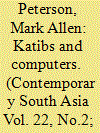| Srl | Item |
| 1 |
ID:
130728


|
|
|
|
|
| Publication |
2014.
|
| Summary/Abstract |
In 1993, the prognosis for Urdu newspapers in north India was dismal. The readership was aging and dwindling as the new generation learned Hindi in Devanagiri script. Urdu calligraphers (katibs) were not passing their skills on to a new generation and writers skilled in Urdu were becoming increasingly hard to find. Fifteen years later, Delhi is home to a prosperous and expanding Urdu press. The number of newspapers had tripled, circulations were often higher than they had been in the past, profits were up and the atmosphere at Delhi's major Urdu newspapers was upbeat. A large part of the explanation lies in the intersection of language ideologies and new writing technologies. On the one hand, Urdu indexes crucial politically urgent populations, leading to a renewed interest in it from many sectors. On the other hand, new more flexible technologies allowed the retiring katibs to be replaced by computer typesetting that strongly resembles north Indian calligraphic styles and new software allows an entire daily newspaper to be assembled and sent to press using a single laptop. Drawing on ethnographic fieldwork in 1993 and 2008 at some of New Delhi's Urdu dailies and interviews with several editors, this article describes the mutual influences of Urdu language ideologies about Muslim identity and technological innovation in the revival of the Urdu daily.
|
|
|
|
|
|
|
|
|
|
|
|
|
|
|
|
| 2 |
ID:
139456


|
|
|
|
|
| Summary/Abstract |
This article explains the networked sociality of young Wa migrant workers made possible through the use of mobile phones and social media when these youths are on the move. Troubled by poor economic conditions in their rural homelands in southwest China, many Wa youth seek work in the urban manufacturing districts in southeast China. Most now rely on mobile phones to connect with the social media, QQ. Mobile networks promote a set of networked socialities which are integral to the continuity and development of Wa migrants’ ethnic ties. Their networking practices show both the constraints they face and the potentiality they develop for voicing social inequality and reconfiguring the dominant Chinese language ideology in urban work environments. Their networked sociality is virtual and yet rooted in their real-world activities involving fragmented engagements with mobile devices and everyday language use. The sociality that emerges is partly a matter of free-will and partly structure-constrained.
|
|
|
|
|
|
|
|
|
|
|
|
|
|
|
|